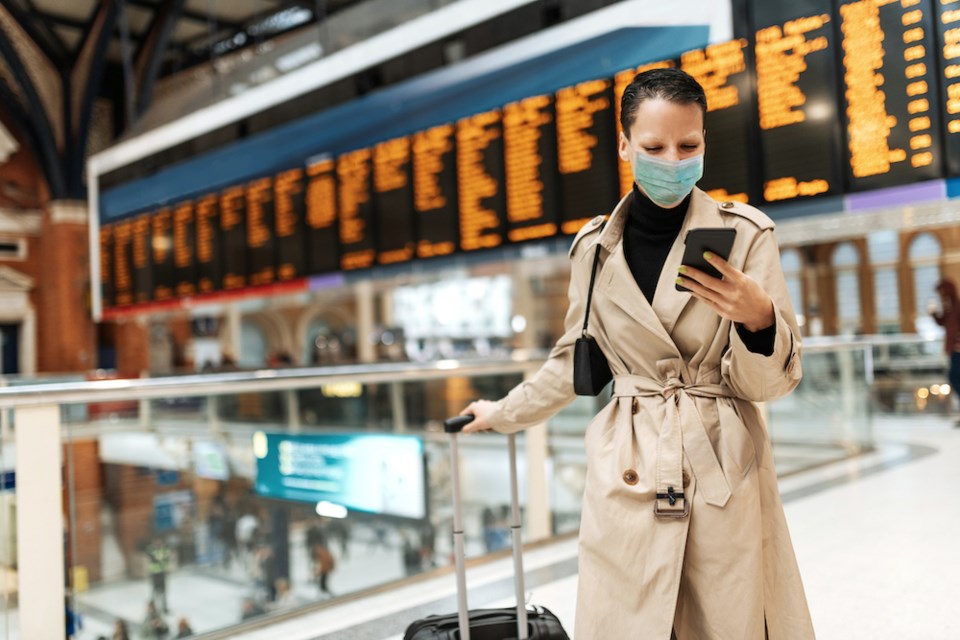If you're planning on flying outside of Canada in the near future, you need to ensure that you'll be able to get a coronavirus (COVID-19) test before you return home.
That said, not all testing facilities are created equal, and you could be denied boarding if you carry a questionable document.
And you could also be fined up to $5,000.
So, before you depart on your next flight, consider the risks involved, and determine if you'll be able to acquire a credible document.
What are Canada's new COVID-19 pre-departure testing rules?
Earlier this month, Transport Minister Marc Garneau issued an Interim Order formalizing the new COVID-19 testing requirements for all air travellers coming into Canada.
Now, everyone flying into Canada will need to have proof of a negative laboratory test result for COVID-19 to the airline prior to boarding their flight.
The test must be performed using one of two types of COVID-19 tests–either a molecular polymerase chain reaction (PCR) or Loop-mediated Isothermal Amplification (LAMP)–and must be conducted within 72 hours of the traveller’s scheduled departure to Canada.
All travellers coming to Canada must present a negative laboratory test (paper or electronic proof of result) at the time of boarding. Failure to do so will mean an automatic denial of boarding by the airline operating the flight to Canada.
Under the Aeronautics Act, travellers caught using a questionable or fraudulent document could be denied boarding, and subject to fines of up to $5,000. Further, additional actions may be levied against the traveller by a Public Health Quarantine officer upon arrival in Canada.
How can Canadians determine if a testing facility abroad is credible?
According to Transport Canada, travellers should have their tests performed at reputable laboratories or testing facilities. These include facilities that are recognized by the local government or accredited by a third party, such as a professional organization or international standards organization.
While there may be cheaper or faster options available, they may provide you with a questionable document.
Travellers must ensure that the negative laboratory test result includes the following data elements:
- Traveller name and date of birth
- Name and civic address of the laboratory/clinic/facility that administered the test
- The date on which the test was conducted
- The method of test conducted (e.g. PCR or LAMP)
- The test result (such as “negative” or “not detected”)
Information on in-country testing facilities can be found in the Health tab of certain destinations. Contact local health authorities, or the nearest Government of Canada office abroad to find out where you can get a COVID-19 test.
A note on international travel
If travellers are considering using a government-funded test or facility, they should confirm that the test results may be used for international travel. Some governments do not permit publicly funded tests to be used for travel.
Passengers are also encouraged to contact the air carrier and/or tour service providers in the event they have concerns about their ability to obtain a negative COVID-19 test prior to their flight, and adjust their departure dates for flights to Canada accordingly.
Canadians travelling abroad are also encouraged to sign up with the Registration of Canadians Abroad if they have not done so already. This service enables Canadians to receive important safety updates from the Government of Canada.
While there currently isn't a law against travel outside of Canada during the pandemic, the federal government says you should avoid non-essential travel outside Canada until further notice.
If you choose to travel despite these advisories, the Government of Canada highlights that:
- you may have difficulty obtaining essential products and services
- you may have limited access to timely and appropriate health care
- you may suddenly face strict movement restrictions and quarantines at designated facilities and at your own cost
- your insurance may not cover your travel or medical expenses
- we may have limited capacity to offer you consular services
No quarantine exemptions
Anyone who receives a negative test result and is authorized to enter Canada must still complete the full, mandatory 14-day quarantine, unless exempted under the Quarantine Act. Travellers are reminded that ongoing vigilance is still required. In addition to completing their full quarantine period, returning travellers must monitor for signs and symptoms of COVID-19 and submit information electronically through ArriveCAN. If symptoms develop, even if mild, or a positive test for COVID-19 is received once in Canada, travellers are advised to contact local public health authorities.
Violating any instructions provided when you enter Canada is an offence under the Quarantine Act and could lead to up to six months in prison and/or $750,000 in fines.




